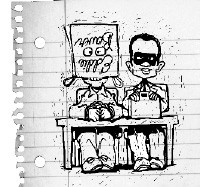
A local organization focused on criminal justice reform is looking for volunteers to be “court watchers.”
Just City Memphis, which pursues a “smaller and more humane criminal justice system” in an effort to minimize the impact of the criminal justice system on people, enlists Court Watchers to sit in on Shelby County courtrooms and observe.
The goal is to encourage accountability, community participation in criminal justice reform, and primarily transparency, Josh Spickler, executive director of Just City, said.
“The legal system in our community is massive, and it operates largely out of sight from most people,” Spickler said. “We believe it is too large, often unfair, and sometimes inhumane, and our mission is to correct it. By introducing people to it — letting them see and hear for themselves how it works — we hope to introduce accountability into a system that doesn’t have much.
“The people who depend upon this system to keep them safe and deliver justice in their community should be able to see how it works. Court Watch offers an opportunity to do that.”
Just City kicked off the program at the beginning of the year and now has 80 trained volunteers. The group aims to have 100 court watchers by the end of the year.
[pullquote-1]
Court watchers are asked to track basic demographic information, such as race, age, and gender. Volunteers also take notes on judges, attorneys, victims, and defendants, recording their temperament, behaviors, and decisions.
Spickler said beyond that, court watchers are not trained to look for anything in particular: “We are very clear that Court Watch is not about catching anyone doing something wrong or embarrassing people, and we ask for respect and decorum above all else.”
For those interested in volunteering, Just City will host a training session this Thursday from 10 a.m. to noon at the Commonwealth Building (240 Madison Ave). Get more information and sign up here.
“In our training, we describe the primary actors in the system, explain generally how court works, and ask watchers to write down anything notable,” Spickler said.
After completing the three-hour training, participants are expected to volunteer for at least one three-hour shift each month.
Other requirements include:
• Weekday morning and afternoon availability
• Ability to keep legible notes and data
• Reliable transportation
• Professional attire for court
So far this year, 615 cases, totaling 75 hours have been watched. Below is data compiled by court watchers in September. Visit Just City’s website to see reports from previous months.
[pdf-1]
 Greg Cravens
Greg Cravens